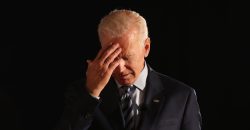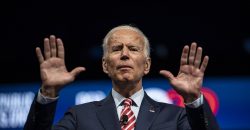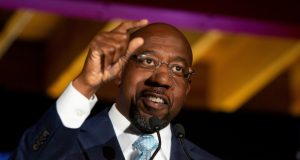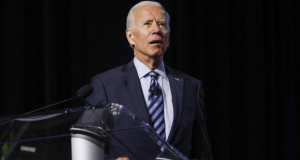Joe Biden’s Iraq War Vote Spells Trouble with Young Primary Voters
42% of Democrat primary voters say they’re less likely to support him because of his 2002 position.
May 20, 2019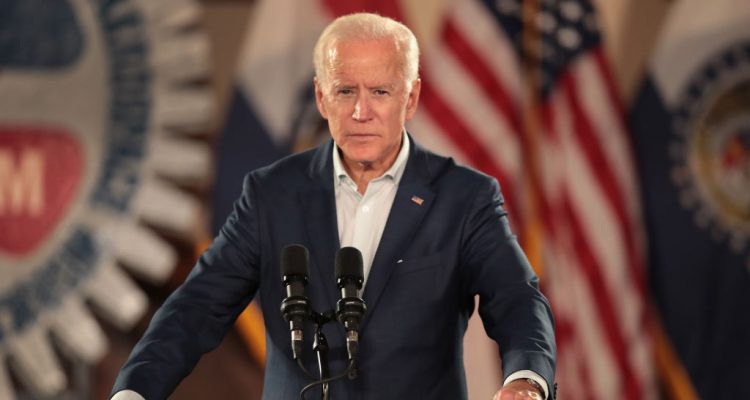
Vice President Joe Biden has taken a commanding lead in a recent polling of the Democratic primary field. In response, his opponents are starting to narrow in on his vulnerabilities, like his 2002 Iraq War vote.
According to May polling from Politico/Morning Consult, Biden’s 2002 vote in favor of the invasion of Iraq has the potential to cause problems with younger voters, with 42% of those polled to be less likely to support him in the primary.
More broadly, Democrats view Biden’s experience in the Senate and as Vice President as his “greatest asset.” However, the Iraq invasion vote will hamstring him in ways that damaged Hillary Clinton in the 2016 primary.
Bernie Sanders is making hay against Biden for his Iraq War vote, as he did in 2016 against Hillary Clinton. Polling shows that Sanders’ criticism will resonate with voters, especially crucial young primary voters.
“Joe Biden’s 2002 vote in favor of authorizing military force against Iraq could hurt his support among the crucial younger voting bloc in the Democratic primary,” said Tyler Sinclair, Morning Consult’s vice president. “Notably, 42 percent of young voters 18-29 say they are less likely to support Biden because of his vote for the Iraq war, compared with 14 percent who say they are more likely and 18 percent who say his decision makes no difference at all.”
The 42% of young voters subsection is higher than the nearly 3 in 10 Democrats who said they were turned off by his Iraq War Vote. While this may not appear to be a fatal flaw, the Iraq War vote polls particularly worse with Democrats than other popular lines of attack, like criticism of Biden’s role in the 1994 crime bill and his votes in favor of free trade deals like the North American Free Trade Agreement (NAFTA) and the Trans-Pacific Partnership (TPP).
While voters see Biden’s experience as his biggest strength in the primary, Biden has also received criticism for his foreign policy record. Former Obama Secretary of Defense Robert Gates has repeatedly criticized Biden’s foreign policy decision-making. On CBS’ “Face the Nation,” Gates stood by comments he made in his memoirs that Biden has “been wrong on nearly every major foreign policy and national security issue over the past four decades.” When Gates was asked whether he thought Biden would make a good Commander-In-Chief, he responded: “I don’t know.”
Biden will point to previous statements saying his vote for the invasion was a mistake, but hindsight years later does nothing to make a case for future decisions, and it certainly does not erase years of statements made by Biden that support regime change and the eventual invasion.
In 1998, Biden called for “nothing short of a replay of the 1991 Gulf War is needed, with the aim of toppling Hussein’s regime.” In another op-ed for The Washington Post in 1998, Biden said, “the only way to remove Saddam is a massive military effort, led by the United States,” citing Hussein’s weapons program.
In October 2002, Biden supported the Bush administration’s effort to put pressure on Iraq with eventual invasion, noting that Iraq’s weapons program posed a threat to the United States. Furthermore, Biden stated that he thought the U.S. “could walk and chew gum at the same time” and start a war in Iraq while also fighting the war on terror.
Over the next twelve years in government, Biden continued to be a vocal participant in debates over troop withdrawals, strategic considerations, and peace plans. In 2006, Biden introduced a plan to “decentralize” Iraq that was compared closely to a partition plan, which was widely panned by experts.
Biden’s record on Iraq will continue to haunt him as his involvement in the war is again brought to light. With Democratic voters, especially younger ones, being so opposed to his record, it will come as no surprise when his Democratic opponents ramp up the attacks.
Keep tabs on the Democrats. Sign up for news.
Keep tabs on the Democrats. Sign up for news.

